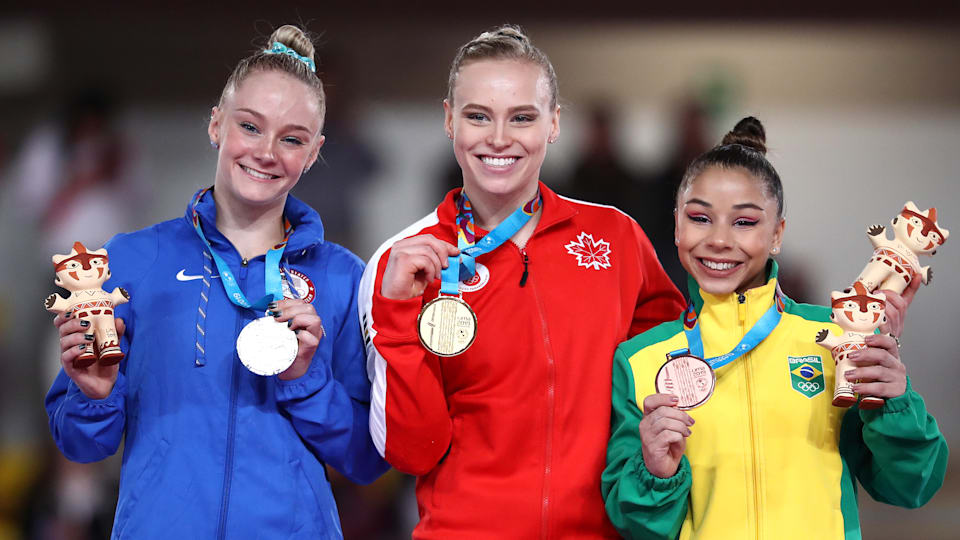
The women’s all-around podium Monday at the Pan American Games looked oddly familiar.
That's because two-time Olympian Ellie Black of Canada and Brazil’s Flavia Saraiva, a 2016 Olympian, repeated their 2015 finishes, taking the gold and bronze medals, respectively.
The U.S.’s Riley McCusker won the silver, subbing in for her fellow American Madison Desch, who took the silver medal four years ago.
“Toronto was incredible because it was at home, in front of everyone,” Black said afterward. “It wasn’t necessarily my goal coming out here to win a gold medal, but I think it is something special to be able to come back and do it again for Canada.”
Black earned a 55.250 to hold off a late charging McCusker who finished with a 55.125. Saraiva took the bronze with a 54.350.
"This was my second Pan American Games all-around final and to come away with another bronze medal is amazing,” Saraiva said.
Back-to-back titles
Black has had impressive results this season including a second place finish at the Tokyo World Cup and her sixth Canadian all-around title.
At 23 years old, Black is perhaps the best she’s ever been.
“I always say age is just a number,” Black told Olympic Channel on Saturday. “I think especially as you get older in this sport, you have a lot of experience and you learn a lot. You learn a lot more about yourself as a person and as an athlete, and I think that can help you grow and get stronger.”
That strength was on display from the start of the women’s all-around final where Black vaulted to the lead after the first rotation, earning a 14.450 with her front handspring layout full vault. She added a strong 14.300 on the uneven bars.
“Vault and bars were really strong for me. I was really happy with those,” she said.
Despite a long wait to perform on the balance beam – where she came to grief in Saturday’s team competition on a double turn – she delivered a solid routine there to improve nearly a full point from qualification.
Entering the final rotation, Black had more than a full point’s lead over McCusker. A mistake on her middle pass seemed to open the door as Black landed a double pike outside of the floor exercise area.
“On floor I had kind of a little ‘oopsie’ as I landed outside of the floor when I landed one of my tumbles,” Black said.
But despite the error, Black completed her end-to-end win.
McCusker rebounds for silver
In the first rotation, McCusker’s Yurchenko double twist earned a 14.250. The vault was one of the 18-year-old’s strongest efforts on the event to date.
But in the second rotation McCusker missed her catch-and-release move (a Ricna). The fall was costly not only because it incurred a 1.000 deduction but she also wasn’t credited for the skill and missed several valuable tenths of connection value.
“I was really proud of myself how I came back,” McCusker said of her rebound after her fall off the uneven bars.
That comeback was spurred by a quick change of setting. McCusker and coach Maggie Haney left the field of play after bars to regroup, taking a moment to themselves in the hallway.
“I told her to chill out, that’s it’s not over until it’s over, and just pretend like you’re back at home practicing,” said Haney.
It worked.
McCusker was stunning on the balance beam, nailing her opening wolf turns and a relatively new acrobatic series, featuring a laid out back flip to two feet. The only truly visible error came on a step backward on her dismount. She earned a 14.200.
Though she trailed Black by 1.050, the Canadian’s tumbling error presented an opening. McCusker needed a 13.651 to win the gold medal. It was a do-able feat for the New Jersey-resident who broke into the 14s in Saturday’s team event.
“I think I had an idea, but I don’t really watch other people go or other people’s scores before I go. I was out there trying to do the best routines I could do,” McCusker said.
She came up just short, earning a 13.525 after stepping out of bounds on her opening tumbling pass.
The American will have plenty of chances for redemption as she takes part in three finals Tuesday and Wednesday in Lima. After that, she’ll head to the U.S. Championships in Kansas City, Aug. 8-11.
“One meet at a time,” McCusker said of managing her busy schedule. “Past that I could make myself a little crazy.”
One-two punch
In the men's competition, Brazil took first and second with Caio Souza (83.500) and Arthur Nory Mariano (82.950), respectively.
“The build-up for this competition has been very long and we did everything in order to deliver here. On each of the six apparatus I showed how well prepared I was for this competition. I am very happy,” Souza said.
For Mariano, who Olympic fans may remember for his emotional reaction to taking the Rio bronze medal on the floor exercise, it was a breakthrough on the international stage in the all-around.
“It’s been years of hard work. I am very proud about what I have achieved here," he said. "And not only me. I am proud of what Brazil has achieved. Yesterday we won the team final, today Caio Souza and me took gold and silver in the all-around. It’s amazing."
Canadian Cory Patterson was the bronze medallist with an 82.200 total in the all-around.
"I went out there and went six-for-six, which I don’t think I have ever done," Patterson said. "I have always had some mistakes. It is an unreal feeling to bring another medal to Canada. It’s incredible."
Top qualifier Robert Neff of the United States dropped to seventh after a mistake on the floor exercise.
